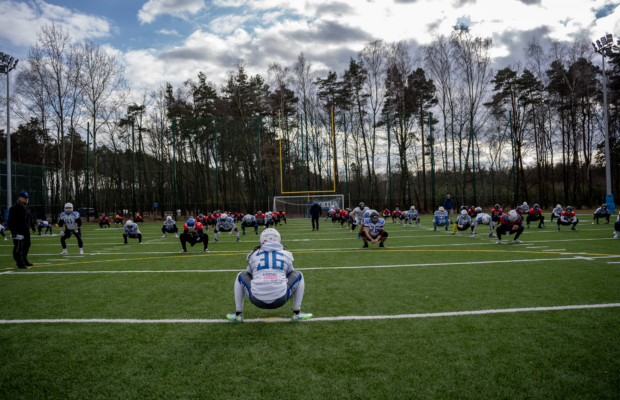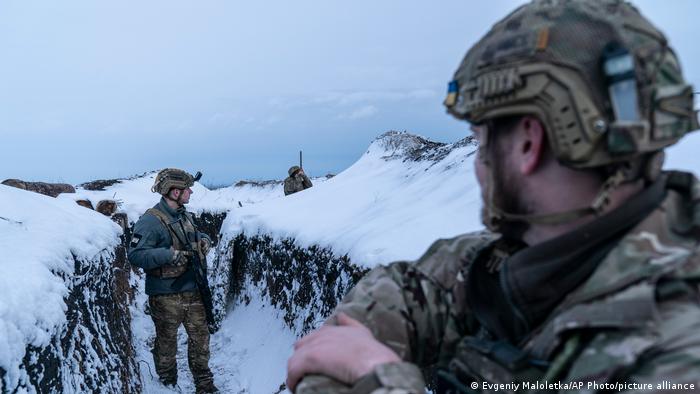Polish football community responds to the crisis in Ukraine

Typically for the Tychy Falcons, early March means pre-season for the Polish American football team. Just two weeks ago the Falcons were playing a pre-season scrimmage as they focused on the rapidly approaching season. Now after the Russian invasion of Ukraine, football seems like an afterthought, but teamwork remains. Falcons head coach Augie Stevens on his team’s mindset during the crisis.
“It’s something that has to be addressed and talked about at practice. I tell them there is a heaviness in all of us. We all know people directly involved, and we know how much our Ukrainian players would love to be with us right now just getting to enjoy playing a game. But this is what football is all about – strengthening ourselves as humans so that when real adversity comes we have the capability to respond.”
The Falcons along with countless generous Polish residents have been responding to the crisis by helping Ukrainian refugees at the overcrowded border. Whether by donating supplies, funds, or driving to the border the response of the Polish community has been strong, and Tychy’s American football team is no exception.
“When the invasion first happened, like most folks outside of Ukraine, we didn’t fully understand the scope. We were in the middle of roster decisions, import recruiting, and talking with players from different Eastern countries. We had just finished a scrimmage and had position meetings the night before. Suddenly there’s a sickening shift as we realize the reality. But that’s when the people in our organization really sprang into action.”
Multiple players on the team make a daily three-hour drives to the Ukrainian border to help the fleeing women and children any way they can. One selfless player has made it his mission to help a groups of vulnerable Ukrainian women and children find a safe haven in Poland. Stevens, an American, on witnessing what’s happening in Poland:
“I’ve been amazed by the Polish response, I’m so proud of this country, and I’m very glad to be living and coaching in the Slavic world right now to witness this. I’m also extremely proud of the humans in my organisation. Immediately our management arranged housing for Ukrainian families of our players, filled it with supplies from player donations, and then our players found them at the border and transported them back. The strength of the Ukrainian people is unbelievable, you see them travelling everywhere through Poland right now, just calmly taking care of their families. Groups of women and children, some with injuries, and you know that suitcase with them is everything they have.”
The Falcons, like many teams in Poland, have a strong Ukrainian influence. Tychy brought in several players from across the border earlier this off-season. Now those brave young men have returned from their football endeavours in order to serve their country in its time of crisis. The Falcons have responded by accepting their families, setting them up with an accommodation in Tychy.
“I’m unbelievably proud of my Ukrainian players for serving their country. Our guys are called to action. I’m extremely proud of all of our players. We have players here who, at their own expense, are making sacrifices to help Ukrainians. Renting vans, donating supplies, it’s a personal sacrifice.
The Wroclaw Panthers, Poland’s premiere American football team has also responded admirably by hosting fundraisers and even donating food and military equipment. By using their reach and football connections the Panthers hosted a charity coaches clinic featuring former NFL coaches Gary Kubiak, Jim Herrmann, Paul Alexander, and current West Virginia head coach Neal Brown.
Across Poland the response to the crisis has been commendable as the country has embraced its role as neighbor helping hundreds of thousands of refugees find safety in its borders. For the country’s niche American football community stepping up to the plate during a time of need is bigger than sports.
“I’m proud to be coaching in Poland and see this, everywhere you travel you see help centers, stockpiles of donations, and people helping refugees at the border. Moments like this are why football is important. It builds strong character, where humans are willing to sacrifice for the greater good. Suddenly the mission is bigger.”
Donate to the humanitarian crisis in Ukraine here

